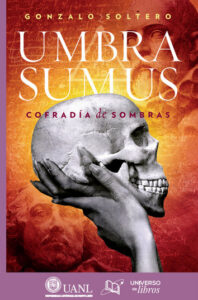In William Shakespeare’s play The Tempest, one of the characters exclaims, “We are made of the same stuff as dreams!” I am sure that, in some of his other works, the English playwright also expressed the complementary idea, simple and forceful, that art makes dreams come true. With both notions, we could devise a third idea (undoubtedly also in some Shakespeare texts) that art is real while reality is not. I would agree. Poetry has more “stuff” of reality than what we call “reality,” except when the latter is crossed by the poetic spirit, the breath of beauty, the tenderness of goodness, and, finally, the most perfect expression of them all: simple and pure love.
(As if by magic, the following quote from Aristotle appeared to me in a Facebook post after I wrote the previous paragraph: “The purpose of art is to flesh out the secret essence of things…”).
Let’s begin with some general facts about the novel I wish to comment on. I recommend the book not only for readers in general but very punctually for high school teachers seeking texts by contemporary Mexican writers to include as reading material in their classes: entertaining texts appropriate for young people and with literary values that parallel those of the universal tradition. Umbra Sumus has these three qualities and alludes to historical facts, scientific discoveries, and philosophical and cosmological reflections that make reading it in the school context even more enjoyable. In Spanish and literature classes around the country, there are such texts by Flor Aguilera, Verónica Murguía, Juan Carlos Quezadas, and José Luis Trueba (to mention a few that I know are present in the classrooms of TEC). Gonzalo Soltero’s new novel may very well add to the collection.
It is not a historical novel, although it speaks of “real life” events associated with the deaths of Shakespeare and Cervantes (which interestingly occurred on the same date: April 26, 1616) and with the scientific theories that arose around Newton and developed over the centuries. Soltero describes the Avon Swan’s (as they called Shakespeare) and many of his contemporaries’ interest in the Occult Sciences, magic, alchemy, esotericism, hermeticism, the Kabbalah, and all kinds of practices that try to illuminate the invisible and secret for the world of the luminous and visible.
 Central to the plot of Umbra Sumus is the duality between these two realities, the visible (real, historical) and the invisible. In the first reality, things are just as they appear, and however terrible they may be, this “reality” reassures us or at least keeps us from metaphysical shocks even more difficult to bear. On the other hand, in the secret, invisible world, where the primeval forces of creation struggle, not only our earthly life is compromised but also our eternal life. To enter that world is to come face-to-face with forces that can lose us forever.
Central to the plot of Umbra Sumus is the duality between these two realities, the visible (real, historical) and the invisible. In the first reality, things are just as they appear, and however terrible they may be, this “reality” reassures us or at least keeps us from metaphysical shocks even more difficult to bear. On the other hand, in the secret, invisible world, where the primeval forces of creation struggle, not only our earthly life is compromised but also our eternal life. To enter that world is to come face-to-face with forces that can lose us forever.
In the presence of this danger, there are only two alternatives, two antidotes, two magical ingredients: one is that which emerges from a dark power that, being cosmic in its essence, materializes among us as a political and economic power, as crime, torture, threat, the supremacy of terror. This ingredient gives those who possess it dominion over matter, facts, and other people. It opens doors for them (if they want it) to an obscure millenary brotherhood that promises its members a habitable world (habitable for them, of course, not for their victims). The other magic ingredient – contrary to the previous one – is the one that the great writers distill by transmuting words into reality and dreams into material life, thus helping the terrifying world to recompose itself. Literature provides us tools to jump into this reality, oppose the millenary and dark sect, and gain a little space for light (“the light that is fed by the decisions that tend it,” says Gonzalo Soltero). Leap towards reality, decision… both ideas remind me of the phrase of another great writer, Ambrose Bierce: “If you want your dreams to come true… wake up!”
It is in this sense that literature transforms the world. It is said that after reading a book, we become others. I would say that we have the opportunity to become others; the literary text opens the opportunity for us, but we must take advantage of it. In Umbra Sumus, that decision, that climax, is part of the plot; it is something the protagonist faces: Is he willing to take advantage of the magical gifts that literature has sown in him? It is not uncommon for this opportunity to be presented to the readers of Umbra Sumus, i.e., reading what the novel narrates as fiction happens to us. In universal literature, many texts describe the magic of literature without creating it themselves. Umbra Sumus is not like that. For both the protagonist and the readers, its ending opens the opportunity to jump into authentic life: “As long as humanity keeps the light in their gaze, this story will continue, which in reality is just beginning, because its end and purpose are to give us a beginning.”
But let’s go to the beginning of the novel. Reinaldo Hilsen, a young Mexican researcher working in London, tries to put a final brush on his Shakespearean studies before being expelled from the island due to oversights with immigration. It is an unexpected incident that takes him out of his inertia and hurls him down a slide of adventures that immediately surpass his initial academic motives. As he falls, the existence of a millenary Chinese criminal organization is revealed to him. It calls itself “Umbra Sumus.” It has secretly spread to all corners of the world, including the British Library, whose hyper-guarded volumes it manipulates with total freedom, and the La Merced market in Mexico City, in whose basements the sect keeps entire families of enslaved Asians working in conditions of misery.
As the back cover of the book announces, the novel is an esoteric thriller with many guns, daggers, murderous partitions, spies, persecutions, crimes, jumps from windows, cold and wet dungeons, betrayals, false friends, false enemies … pages and pages of chilling and pleasant action with the agility the back cover describes as “fulminating speed.”
The common thread (rather the threads, since there are several) interweaves a plot with at least two reading coordinates (that is, its events can be interpreted in two ways). On the one hand, the story can be understood as an international conspiracy fed by shadowy forces, and on the other, as the progressive submersion into madness by Reinaldo, who sees Moors with knives everywhere, creating true duality and constant doubts for the reader, because the blades seem quite real. However, although the reality of Reinaldo continually tells us that it is true he is being pursued, the story also reminds us to be alert and that it is possible to doubt everything that is happening. I must confess that, in my opinion, the text has some slight inconsistencies that make the story confusing; that is, it makes us doubt whether the duality of the plot is intentional or if it is an error of the author, mere literary disorder. However, the recurring mastery of the text manages to dispel the doubt very soon and shake off those minor omissions to unfold before us a magical world indeed “woven with the stuff of dreams.”
Examples from that world: If someone is the victim of a beating in a cantina and immediately tries to decipher the trace of his wounds as a map that will guide him through the streets of Mexico City, we will know that he is crazy. But in the dual world of Umbra Sumus, such thinking can always be wrong. Whether we are in reality or fantasy is not resolved by pointing to one of those two options: we can believe or not that destiny awaits in that GPS of bruises and bloody scratches. Similarly, when Reinaldo enters a love relationship, the girl in question is encrypted by a unique and double significance: She is the most dangerous member of Umbra Sumus and the most candid and in-love young woman in the neighborhood. Her name is Regina, and the name could not be more appropriate – or fortuitous if it was subconscious fortune that gave it to the author: In the context of Mexican secrecy, the name Regina has a powerful charge. It is a central name in more or less contemporary esotericism that, beyond our judgment of it, has earned a place in the culture and inevitably gives Reinaldo’s girlfriend a transparent innocence and a prolonged mystery.
Therefore, we have an exciting, interesting, and above all, magical novel that allows us to jump into the real reality of the world. Not all literary experiences, as I say above, end in this opportunity. I, who submerged myself in the pages of Umbra Sumus, have certainly emerged from them with the possibility of being another. Its magic touched me, leaving me the option to believe in it, which is the same as giving me the gift of using it. In reality, this can not be a surprise to anyone. This magic is the promise of all literature, and it is not strange that Umbra Sumus by Gonzalo Soltero accomplished its mission.
UMBRA SUMUS, by Gonzalo Soltero, is a publication of the Autonomous University of Nuevo León (UANL) and the Universo de Libros publishing house.
Translation by Daniel Wetta
This article from Observatory of the Institute for the Future of Education may be shared under the terms of the license CC BY-NC-SA 4.0 
)
)


)